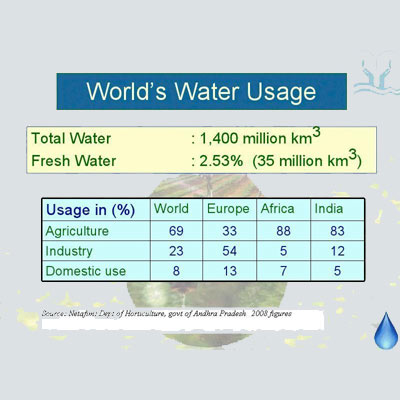
Water is back in the news. It’s drought time in Maharashtra. Some legislators have even begun demanding water supply cuts for industry and residences.
In Delhi, there is a clamour for privatisation of water supply. Somehow, India’s policymakers appear to have forgotten that this was how an attempt was made to privatise power supply as well, giving rise to Enron’s entry into India with sovereign guarantees. Without a public utility omnibus law protecting citizen’s interests – as in the US – it’s dangerous to privatise any public utility.
Tamil Nadu has already become the first state to opt for desalination of water. Andhra Pradesh wants to have a desalination plant as well. But in the midst of all this, some basic facts are forgotten.
Worldwide, agriculture accounts for not more than 70% of total water usage (see table). Industrialised countries witness water consumption by agriculture at just 33%. In India, agriculture is the biggest guzzler of water – at 83%.
Take a second important fact. As any country begins to industrialise, the share of water consumption by industry shoots up – for cooling, mixing and washing.
Industry accounts for 23% of global water consumption. In industrialised countries, the share of industry is as high as 54% of water consumption.
True, the share of water consumption of Africa’s agriculture is higher than that of India. But that is because Africa is not industrialised, and has few pretensions of becoming a global power.
If any water consumption has to be cut, it will have to be in agriculture. Policymakers must learn to stop blaming industry or even cities.
Focus instead on recycling water, and on prevention of pollution of India’s lakes, streams and rivers.
Focus also on limiting access to free water which, abetted by free electricity, has made farmers reckless with water consumption. In Punjab, excess water in the fields has resulted in the leeching and salinity of soil. To reduce water consumption, electricity too must be fairly priced, and power connections supplied to only those farms that use drip irrigation, which reduces the consumption of water, and actually increases productivity.
The only state which has done this effectively is Gujarat.
Moreover, if water is in short supply, incentivise relocation of water-guzzling plants to areas that have abundant water – like the Gangetic plains. Maharashtra’s politicians will not like this, but water is more important than the greed of politicians.
There is water theft as well. Mumbai ‘loses’ 80 million litre of water daily. The state could be losing many times more. That, too, needs to be checked.
Finally, before India moves into desalination, some normative costs should be taken into account.
The best desalination plants, using solar power and good technology, sell water at around 4 paise per litre, after accounting for interest, recurring costs, and amortisation of capital expenses. This is lower than the numbers churned out by most state governments.
Someone is being either incompetent in protecting consumer interests, or collusive in milking the nation.
